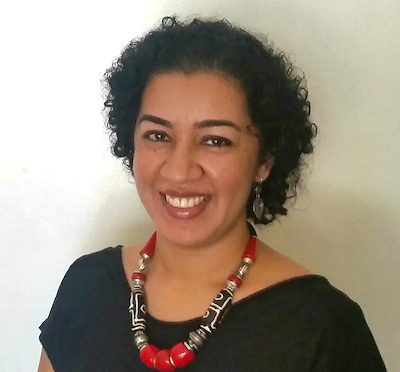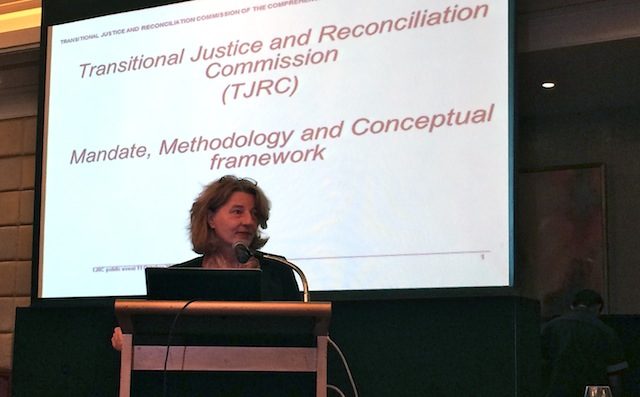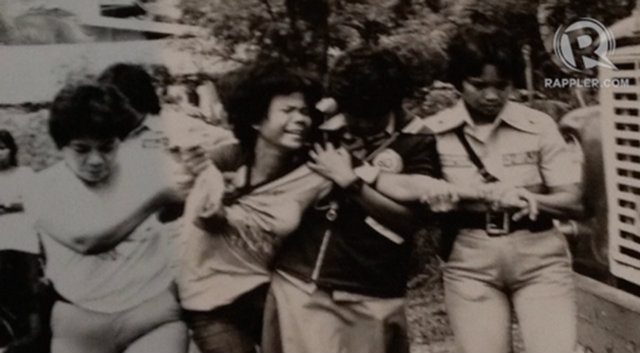SUMMARY
This is AI generated summarization, which may have errors. For context, always refer to the full article.

Given the current situation in the peace process, it is important to look ahead and reset priorities, with the aim of seeing the peace process come to fruition. Revisiting the past through mechanisms of transitional justice are necessary to ensure a sustainable peace and a better future for all.
History
The conflict in Mindanao is one of the oldest in the world, with roots in pre-colonial times. The cost of the conflict in human and material terms is high. There have been various peace talks over the years, more recently in 2001 to 2003 and 2005 to 2008, but without a successful conclusion.
Recent negotiations have resulted in the most progress so far. In October 2012, the Philippine government and the Moro Islamic Liberation Front (MILF) signed a Framework Agreement on the Bangsamoro. Subsequently, the Comprehensive Agreement on the Bangsamoro (CAB) in 2014 included the FAB and annexes relating to transitional arrangements, wealth sharing, power-sharing and normalization. (READ: TIMELINE: The long road to the Bangsamoro region)
The proposed Bangsamoro Basic Law (BBL) reflected the peace agreement and was to be passed into law. While there have been armed clashes between 2011 and 2013 in Zamboanga, the most serious one took place in Mamasapano on January 25, 2015, resulting in the death of 44 Philippine police commandos, 18 MILF members, and 5 civilians. Consideration of the BBL has been postponed till after the May 2016 national elections. However, this enforced hiatus may be an opportunity to address the issues linked to transitional justice and the peace process.
Rationale to move forward
While the legal and political arguments regarding the BBL are better left to national expertise, it is important to address the rationale and the manner by which to look to the future.
It may seem premature to address questions of transitional justice (such as accountability and justice for rights violations) given the current uncertainty of the peace process, but this is a prerequisite for any meaningful progress. At this stage, the finish line for the peace process is closer than it has ever been, and there are substantial gains in sustaining the momentum. There are also significant dangers to not continuing the process meaningfully, including a resurgence of violence and resumption of conflict.

The steps ahead pertain to difficult questions of accountability, justice, and human rights, all of which have to be dealt with eventually. Given the likelihood of such unresolved issues jeopardizing peace, it is opportune to take stock of the wider issues and implications.
While undeniable that the Philippine context is unique, this should not preclude meaningful comparisons to other country contexts that may provide guidance. There are peace processes that have included transitional justice measures with varying degrees of success and implementation. In this respect, the Philippines has much to learn not just from best practice, but also from errors to avoid.
The Philippines has made great strides in the peace process, particularly compared to South and Southeast Asian countries. While many countries do not have viable peace processes, those emerging from conflict are increasingly faced with the necessity of dealing with transitional justice issues. Nepal, after the cessation of hostilities, is struggling to address questions of accountability and justice. In Sri Lanka, an armed “victory” has not dissipated the unresolved questions of justice and human rights, which are now just being addressed by the new government.
In some cases, such issues may be dealt with concurrently alongside negotiations of a peace agreement. In Colombia, the agreement forged in January 2016 between the government and the FARC to establish a truth commission was done alongside the peace talks. This is also viewed as a confidence building measure in the wake of the resumption of armed violence. Hence, setbacks in a peace process should not mean abandoning transitional justice issues.

In the Philippine context, many of these sensitive issues have been entrusted to the Transitional Justice and Reconciliation Commission (TJRC) to assess and provide recommendations to the peace panels. Per Sections II (1) & (2) of the terms of reference of the TJRC, “legitimate grievances,” “historical injustices,” “human rights violations and marginalization through land dispossession,” all are to be examined with the aim of “healing and reconciliation” (CAB, Annex on Normalization).
This potentially could include a comprehensive reparations policy, the creation of a truth commission and special tribunals or panels for prosecution, and other means of acknowledgement and reparation. While the TJRC has completed its work, the final report is not yet public. The following section highlights some of the issues that may have been dealt with, providing examples from other countries.
Truth commissions, reparations
Human rights violations, land issues, and the status of indigenous people and those internally displaced due to decades of conflict are among the issues to be addressed in the Philippines.
Mechanisms to address these issues include reparations, truth commissions, prosecutions, and other forms of acknowledgement and apology. It must be stressed that not all these mechanisms are suited to a particular context, or that all must be used. Rather, they are potential options, depending on country context and their relevance. There is also substantial divergence in the design and form of each of these mechanisms; hence, there is no fixed template. However, there is now a substantial body of practice regarding what works and what does not.
Reparations include various measures as a means of restoring harm done, such as monetary compensation, livelihood support, psycho-social support. The process involves determining who are eligible, the timeframe, and the violations.
In Peru, collective and individual reparations were given to victims and communities of the dictatorship and armed conflict. In Morocco, nearly 4,000 victims of human rights violations were provided compensation. In Chile, many victims were given medical services and support. In the Philippines, the law provides for a Human Rights Victims Compensation Board which is now processing over 75,000 claims for Marcos era violations. While all these examples are complex and not without problems, they are indicative of the scope and breadth of reparations programs.

Truth commissions are another mechanism to address the past, and typically provide the historical context of a conflict and ensuing violations. Proceedings are victim centric, to give victims a voice and an opportunity to be heard. In some cases, truth commissions have been accompanied by amnesties, the scope and remit of which are greatly varied. While the South African truth commission had an extensive amnesty procedure, many others have not done the same. Other relevant examples include the East Timor truth commission, the Clarification Commission in Guatemala, and the Kenyan truth commission.
Another means of redress is through prosecution. However, this may be highly sensitive in ongoing negotiations. In some cases, prosecution through international or hybrid courts may be undertaken (such as in the Balkans and Cambodia). In other countries, the process is done domestically, depending on ability, resources, as in Argentina, Brazil, and Guatemala.
Currently in Colombia, special panels have been created for the prosecution of former FARC guerrillas. However, the question of prosecution of state agents including paramilitaries is still to be decided, and is controversial. Further, the special panels have been criticized, given the opacity of the process and substantially reduced sentences.
Acknowledgement and apology are also important means of addressing the past. The quality, manner, and type of apology are significant in determining the genuineness and impact.
Apologies have been issued by governments in addressing past injustices to indigenous communities such as in Australia and Canada, as well as for past human rights violations (such as arising from the legal case of Fred Korematsu, for the internment of US citizens of Japanese origin during the second world war). The latest to come under scrutiny is the Japanese apology to comfort women in South Korea. However, it has excluded comfort women in the Philippines and leaves much to be desired by way of official acknowledgement and apology.
What happens next?
The complexity of any peace process cannot be underestimated. In the Philippines, substantial hurdles have been overcome but with additional difficult questions still to be resolved. Hence, there is a need to still look ahead and plan for the future.
Addressing the violations of the past that have an ongoing impact on lives and ultimately affect the realization of a sustainable peace is a task that must be undertaken. While there are various steps along the way to peace, addressing issues pertaining to transitional justice is a significant step. Such as in Colombia, these processes are not considered mutually exclusive, and setbacks in peace processes should not derail efforts to address issues pertaining to justice, accountability, and human rights violations. – Rappler.com
Priya Pillai is a lawyer, with a PhD in international law and transitional justice from the Graduate Institute of International and Development Studies, Geneva. She has worked at the United Nations International Criminal Tribunal for the Former Yugoslavia, the International Federation of Red Cross and Red Crescent Societies, and on various international law and human rights advocacy campaigns. Priya has an LL.M from New York University and a law degree from India. She is currently based in Manila.
Add a comment
How does this make you feel?
There are no comments yet. Add your comment to start the conversation.